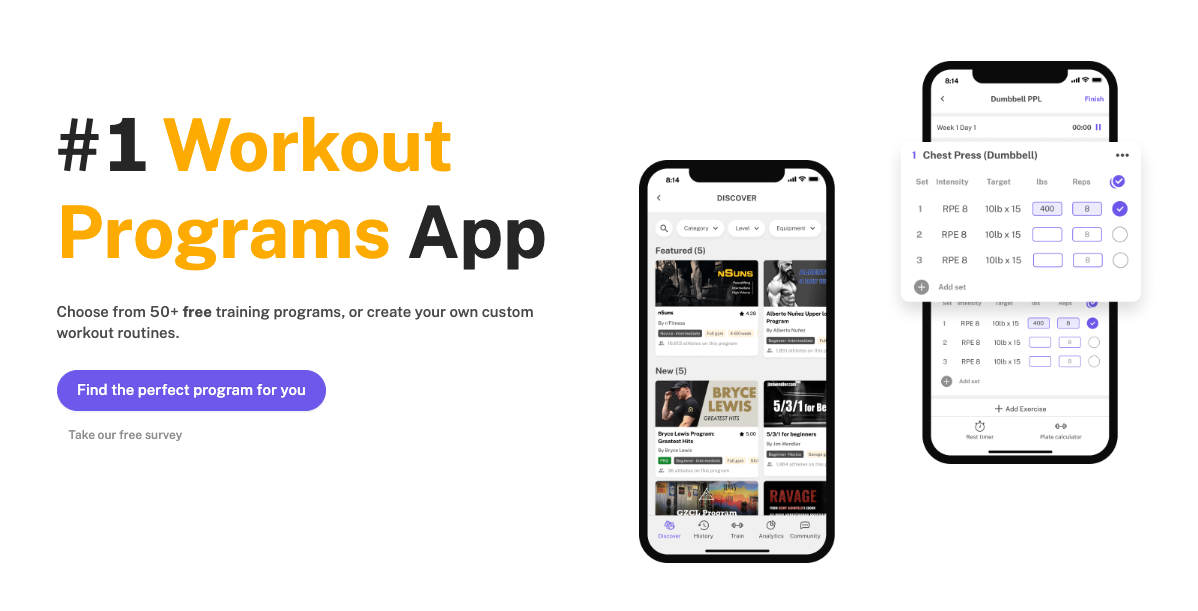Importance of Tracking Workouts: Achieve Better Fitness
Written by The Boostcamp Editors
Achieve Better Fitness: Importance of Tracking Workouts
When it comes to seeing how far you've come in your fitness journey with size and strength, sure the weight on the scale and the weight you throw up on bench press definitely is a good way to tell, but those things take time to notice. If you are looking for quicker results, then maybe it's time to start tracking your workouts. Not only does tracking your workouts help you stay motivated and confident, but it also plays a vital role in making sure that you are achieving your fitness goals.
Let’s discuss the importance of tracking your workouts and how it can help to enhance your fitness progress. We'll also cover the methods and tools available for tracking workouts, including traditional and digital options, and explore the pros and cons of workout tracking. Additionally, we'll guide you on deciding what and when to track your workouts for optimal results. And finally, we'll touch on how fitness apps can enhance your workout tracking experience. So why wait? Start tracking your workouts today for a better, stronger tomorrow!
Let’s get started.
Understanding the Importance of Tracking Your Workouts

Tracking workouts offers valuable insights into fitness progress, facilitating goal achievement and promoting physical activity. For example, if you are trying to get ready for a powerlifting meet, and you are trying to see if you are prepared, then tracking your workouts may be the way to go. Let’s break it down further.
The Role of Workout Tracking in Fitness Progress
Properly monitoring workout progress is vital for achieving fitness milestones, such as an increase in weight on your big compound lifts, or even those accessory movements. It promotes a positive attitude toward exercise and enables adjustments for progression. Tracking allows for metrics monitoring, ensuring endurance and wellness are on track.
Enhancing Motivation and Confidence through Tracking
Not only does tracking workouts help see physical progress, but consistent workout tracking boosts motivation, fostering a positive attitude and empowering individuals, so you will continue to be hungry for more. Proper tracking promotes mental health, wellness, and a friendly fitness community. Tracking workouts ensures a sense of achievement, enhancing overall fitness journey confidence.
The Methods and Tools for Tracking Workouts
The process of tracking workouts encompasses various methods, from traditional fitness journals to utilizing modern fitness and activity trackers. Whether you are a veteran lifter or new to the gym, personal trainer guidance and group fitness classes also play a significant role in aiding workout tracking to achieve fitness goals.
Traditional vs Digital Tools for Workout Tracking
When considering workout tracking, individuals have the choice between traditional methods like workout journals that consist of the pen and paper, and digital tools such as fitness trackers and workout apps that can be stored right on your phone. Both are great options when it comes to seeing your progression, and that being said, let’s take a deeper dive into traditional vs. digital tools for workout tracking.
Choosing the Right Tool According to Your Goals and Preferences
When selecting workout tracking tools, consider personal fitness goals and preferences. Choose tools for tracking endurance for cardio workouts, strength training, and different workout intensities, as you constantly want to be pushing yourself by incorporating things like progressive overload and deload weeks to make sure you are on the right track. Utilize activity trackers to monitor progress and metrics, and try free trials for fitness apps.
The Pros and Cons of Workout Tracking

Tracking workouts enhances fitness levels, endurance, and progression, serving as a fitness assessment tool for measuring progress and insight into milestones. However, over-tracking may lead to imbalance in lifestyle, while the positive impact on fitness and mental wellness prevails. That being said, you do not need to be staring at your workout tracker 24/7.
How Tracking Boosts Fitness Levels and Achievement
By keeping tabs on your workouts, you can propel fitness progression and achieve personal goals. Tracking metrics like your one rep max, different tempos, and modifications fosters consistency and bolsters overall fitness, strength, and endurance. It's a pivotal step toward fitness milestones and hypertrophy.
Potential Downsides of Over-Tracking
When focusing too much on metrics, mental wellness can suffer. It's crucial to avoid setbacks by balancing tracking and personal goals. Over-monitoring may lead to inconsistent fitness progress, so maintaining a balanced approach is key.
Deciding What and When to Track in Your Workouts
Deciding which elements of your workouts to track, such as strength training, endurance, and tempo, is the first step. Setting tracking intervals ensures consistency, while identifying metrics and setting goals helps measure progress. Consider workout tracking frequency and decide on the best stats and metrics to track.
Maintaining consistency in workout tracking is vital for effective fitness assessment and better progress. It helps in maintaining workout consistency, offers valuable insights into fitness progress, and is essential for measuring workout progress. Consistency in tracking workouts is the first step towards achieving fitness goals. For example, if you track your workouts one week, but not the next, things could be skewed and you may not be where you think you are.
Utilizing Workout Data for Optimum Fitness Gains
Properly harnessing workout data is essential for achieving feasible fitness goals and optimizing fitness gains. Analyzing this data allows for personalized exercise plans, effective fitness progress tracking, and improvement of fitness metrics and stats. This utilization is crucial for overall fitness enhancement.
Understanding your tracked data is essential for assessing fitness progress and making necessary adjustments. It helps in modifying exercise plans, adjusting training schedules, and ensuring accurate tracking of fitness progress. Interpreting tracked workout data is a crucial step towards achieving your fitness goals.
Making adjustments based on tracked progress ensures fitness progression and improved milestones. Tracked progress guides effective modifications for better fitness outcomes, aiding in achieving goals. It's the first step towards adapting your workout plan for optimum fitness gains.
The Role of Fitness Apps in Workout Tracking
While writing down your workouts on a piece of paper is definitely a good way to track, enhancing workout tracking, fitness apps provide comprehensive metrics and facilitate seamless tracking of workout stats. They play a pivotal role in assessing fitness progress with precision, offering accurate tracking for fitness goals. Utilizing fitness apps streamlines workout tracking and assessment of progress.
How Fitness Apps Enhance Workout Tracking
Enhancing workout tracking through real-time features, fitness apps offer diverse options for efficient metrics tracking. The integration of these apps streamlines progress tracking, ensuring more accurate and comprehensive workout stats. Utilizing fitness apps enhances the accuracy of workout metric tracking, boosting fitness outcomes.
The Best Fitness App to Enhance Workout Tracking
Enhancing your workouts has never been easier than with Boostcamp. When it comes to incorporating some new exercises into your workouts and seeing how you are progressing with them, you would want to find a program that caters to your needs and guides you in the right direction. When it comes to measuring your progress, staying on track, and continuing with linear progression, then finding a good workout program is the key.
Where do you look for a good workout program? Check out the Boostcamp App for some great programs.

Boostcamp is home to over 50 FREE workout programs that consist of strength, hypertrophy, or functional fitness, or both. However, with Boostcamp, you don’t have to just follow pre-written programs and track your progress with them, you also can create your own program as well, whether your goals are powerlifting or bodybuilding or some other sport. Even if you create your own workouts, you can still easily track your progress to make sure you are on the right path. That being said, when you are looking to make sure you are making progress, then check out Boostcamp.
Is It Necessary to Track Every Single Workout?
Is tracking every single workout necessary? Tracking every workout provides comprehensive insights into fitness progress and aids in maintaining a positive attitude towards goals. Consistently tracking contributes to effective fitness progression and a thorough understanding of metrics and stats. It's beneficial for a comprehensive fitness assessment.
Conclusion
Tracking your workouts is not only important for monitoring your progress, but it also plays a crucial role in enhancing your motivation and confidence. Whether you choose to use traditional pen and paper or digital tools such as fitness apps, tracking allows you to interpret your data and adapt your workout plan for optimum fitness gains. However, it's essential to find the right balance between tracking and over-tracking, as excessive focus on numbers can sometimes detract from the overall enjoyment of your fitness journey. Remember to prioritize consistency in your tracking and utilize the insights gained from your tracked data to tailor your workouts according to your goals. So start tracking your workouts today and take your fitness to new heights!
Also, be sure to follow Boostcamp on Instagram and subscribe on YouTube!

